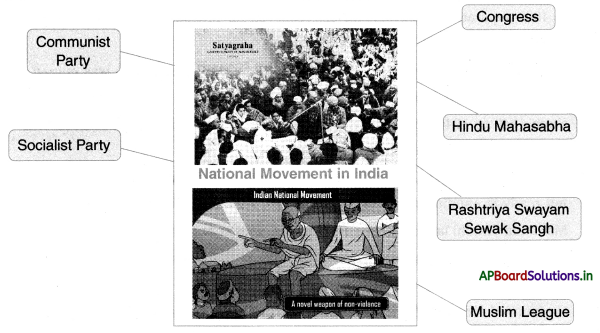Students can go through AP State Board 10th Class Social Studies Notes Chapter 16 National Movement in India–Partition & Independence to understand and remember the concept easily.
AP State Board Syllabus 10th Class Social Studies Notes Chapter 16 National Movement in India–Partition & Independence
→ The British Government has shown its double standards in the expectation that India should support them in fighting the Fascists but it is not giving India full freedom.
→ Congress’s demand for the immediate national government was put down by the British on the pretext that it did not represent all Indians, like Muslims.
→ The Muslim League was formed in 1906.
→ In 1909 separated constituencies are reserved for Muslims as per the demand of the Muslim League.
→ PAKISTAN (from Punjab, Afghan, Kashmir, Sindh, and Baluchistan) was coined by Choudhry Rehmat Ali in the 1930s.
→ From 1940 to 1946, the League was able to convince the Muslim masses of the benefits and need for a separate nation.
→ In the spring of 1942, Cripps Mission came to India to seek help in fighting Japan, but not ready to appoint an Indian as the Defence Member of the Executive Council.
→ Mahatma Gandhi launched the ‘Quit India’ movement in August 1942.
→ Subhash Chandra Bose wished to fight against the British by joining Japan and Germany to get independence soon.
→ He founded Indian National Army with the prisoners of war in Japan (who belonged to Indian origin) and fought with the British for 3 years.
→ In 1946 the soldiers of INA were imprisoned and the British decided to punish them after trials.
→ These trials national consciousness gained prominence over Hindu-Muslim identity and separate politics.
→ In 1946, the guards of the Royal Indian Navy in Bombay harbor went on a hunger strike which spread entire India.
→ Cabinet Mission came in 1946 to discuss the transfer of power to India but wanted to keep India united.
→ Muslim League observed ‘Direct Action Day on 16 August 1946 to win Pakistan.
![]()
→ The formal transfer of power from the British Govt to Pakistan would be done on 14th and to India, it would be done on the 15th of August, 1947.
→ Around 1.5 crore people, both Hindus, and Muslims, were displaced at the time of partition, and between 2 to 5 lakhs were killed.
→ Father of the Nation fell to 3 bullets in the evening of 30 Jan 1948, Nathuram Godse was the assassin.
→ Integration of around 550 Princely states was the responsibility of Sardar Patel.
→ All Princely states except Hyderabad, Junagadh, and Kashmir joined India before Independence, and these three within 2 years after them.
→ Dominion status: The status of a country of the British Common-wealth that had its own government but not a sovereign nation.
→ Divide and rule: The policy followed by the British to divide the unified Hindu-Muslims and weaken the national movement.
→ Separate electorate: Separate electorate ¡s the type of ElectÍon in which minorities select their own representatives separately.
→ Province: One of the areas that some countries are divided into, with its own local government.
→ Provincial: The assemblies that were elected by voters in British India assemblies in provinces independently.
→ British India: The part of India that was directly ruled by the British.
→ Native India: The part of India that was ruled by the Indian princes.
→ Princely states: The regions in Native India that were ruled by the Indian princes.
→ Central Assembly: The assembly that was elected by the voters of British India, all provinces put together.
![]()
→ Prime Minister: The chief of the provincial assembly (now as Chief Minister)
→ Sovereign nations: The nations which can take their internal and external affairs decisions, on their own.
→ British common: The group of countries once ruled by the British as an Imperial wealth country.
→ IndivIdual: Satyagrahi comes to a public place individually and makes a satyagraha speech against the British attitude and gets arrested.
→ Minority: A small group within a country that is different, because of race, religion, language, etc.
→ Cripps Mission: Stafford Cripps came to India in the spring of 1942, to get Indian soldiers to fight against Japan, but England was not ready to allow India to form National Government.
→ Cabinet Mission: Pethick Lawrence, Stafford Cripps, A.V. Alexander came to India in 1946 in to negotiate on the transfer of power as India remains united.
→ Instrument of Accession: Princely States, after independence needed to sign this agreement to join India.
→ Privy-purse: The allowances paid to the Ìulers of princely states after signing the Instrument of Accession to meet their personal expenses.
![]()
→ Colonialism: A developed country making the underdeveloped countries as colonies and getting raw materials at lower prices and selling finished goods at higher prices, thereby exploiting them.
